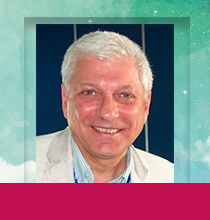
Prof. Andrei Tchernykh is engaged in an extensive research on grid and cloud research addressing resource optimi-zation, both, theoretical and experimental, security, uncertainty, scheduling, multi-objective optimization, heu-ristics and meta-heuristics, adaptive resource allocation, energy-aware algorithms and Internet of Things (http://usuario.cicese.mx/~chernykh/).
Andrei Tchernykh is holding a full professor position in computer science at CICESE Research Center, Ensena-da, Baja California, Mexico, and chairing the Parallel Computing Laboratory. He obtained his PhD in 1986 from the Institute of Precision Mechanics and Computer Engineering of the Russian Academy of Sciences, where he took part in the supercomputer ELBRUS development and implementation. He gained industrial expe-rience as supercomputer design team leader in Advance Technical Products Corp, and Supercomputer Design Department of Electro-Mechanical Enterprise, Russian leaders in HPC design and development.
Tchernykh leads a number of research projects and grants in different countries funded by CONACYT, NSF, ANII, Ochoa, INRIA, FNR, UC MEXUS, DAAD, LAFMI, UJF, INPG, REDII, FUMEC, etc. He has pub-lished about 200 papers, and served as a TPC member and general co-chair of more than 240 professional peer reviewed conferences. He has graduated 36 Ph.D. and M.S. students, and served as the External Examiner for Ph.D. programs in India, Malasia, Germany, Luxembourg. México, and France.
His scientific expertise is awarded by Level 2 in National System of Researchers (SNI), Mexico. He is awarded Global Scholars Fellow at Tsinghua University (China), German Academic Exchange Service fellowship at Uni-versity of Göttingen, Dortmund University, Technische Universität Clausthal, and Severo Ochoa fellowship at Barcelona Supercomputing Center (Spain). He was an invited Visiting Researcher at Centre de recherché INRIA Lille - Nord Europe (France), Université Grenoble Alpes (France), Luxembourg University (Luxembourg), Mos-cow Institute of Physics and Technology (Russia), Institut National Polytechnique de Grenoble (France), Uni-versity of California–Irvine (USA), University of Southern California (USA), Université Joseph Fourier (France), UdelaR (Uruguay), etc.
He is editorial board member of several journals, such as International Journal of Metaheuristics, Supercompu-ting Frontiers and Innovations, Computational Mathematics and Software Engineering, Proceedings of ISP RAS, etc. He also has served as a guest editor for several special issues including International Journal of Approximate Reasoning (Elsevier) Special Issue on Uncertainty in Cloud Computing: Concepts, Challenges and Current Solutions
Conferencia:
Intelligent fog-edge-cloud computing for IoT under uncertainty with adaptive security
CICESE Research Center, Ensenada, Baja California,/ México,
http://usuario.cicese.mx/~chernykh/
Managing information in many areas such as smart city, smart industry, smart medicine, etc. will be strongly associated with fog-edge-cloud computing for the Internet of Things (IoT) and Industrial Internet of Things.
Despite many advantages of the IoT, it brings high risks of confidentiality, integrity, and availability associ-ated with the loss of information, denial of access for a long time, information leakage, conspiracy, etc. One of the challenges is to design reliable fog-edge-cloud systems that mitigate the uncertainty of the occurrence of technical failures, data security breaches, collusion, etc.
Dynamicity of characteristics and elasticity of IoT have a positive impact on Quality of service. Unfortunate-ly, they add a considerable uncertainty on various levels of the computation, communication, and storage. The processing and distribution of data require highly available, scalable, resilient and fault tolerant infrastructure to provide a timely response.
In this talk, we discuss methods and algorithms for supporting security expectations and requirements of IoT under unknown risks that are difficult or impossible to anticipate and cannot be managed proactively. They are based on mechanisms of adjustable and adaptive security, reliability, and redundancy to cope with different user-provider preferences, workloads, system state, errors, and fog-edge-cloud properties, etc




